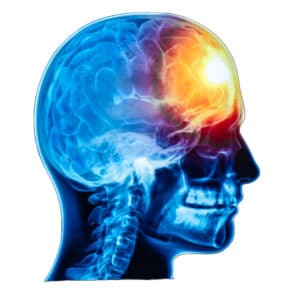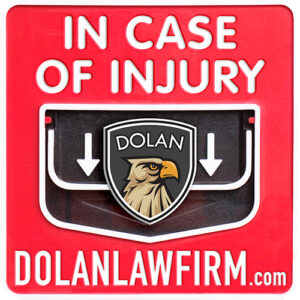Have You Or A Family Member Suffered A Brain Injury Due To The Fault Of Another?
Everyone is at risk for a traumatic brain injury (TBI), especially children and older adults. Approximately 5.3 million Americans are living with a TBI-related disability. A traumatic brain injury (TBI) can cause a wide range of cognitive difficulties which can lead personality changes and an inability to manage emotions or anger. TBIs contribute to the deaths of nearly 50,000 Americans annually. Severe, non-fatal brain injuries can leave the victims in a vegetative state for the remainder of their lives and require lifetime medical care. Fortunately, most TBIs that occur each year are closed head trauma (concussions) and other forms of mild TBI. These injuries, however, should be taken seriously.
What Is Traumatic Brain Injury?
The U.S. Center for Disease Control defines a traumatic brain injury (TBI) as “a disruption in the normal function of the brain that can be caused by a bump, blow, or jolt to the head, or penetrating head injury.” The degree of damage from a TBI depends mainly upon the nature of the event and the force of impact. The Mayo Clinic reports that a TBI may include one or more of the following factors:
- Damage to brain cells may be limited to the area directly below the point of impact on the skull.
- A severe blow or jolt can cause multiple points of damage because the brain may move back and forth in the skull.
- A severe rotational or spinning jolt can cause the tearing of cellular structures.
- A blast, as from an explosive device, can cause widespread damage.
- An object penetrating the skull can cause severe, irreparable damage to brain cells, blood vessels and protective tissues around the brain.
- Bleeding in or around the brain, swelling, and blood clots can disrupt the oxygen supply to the brain and cause wider damage.
What Are The Principle Causes Of Traumatic Brain Injury?
The leading causes of TBI are falls, assaults (being struck by or against an object), and motor-vehicle crashes. An additional common cause of TBI are injuries while playing sports or engaged in recreational activities. Nearly 3 million visits to emergency rooms and hospitals due to TBI occur annually in the U.S.
What Are Traumatic Brian Injury Signs And Symptoms?
A TBI may cause varying degrees of short-term and long-term cognitive, physical and behavioral changes. This can include relationships with family and friends, as well as their ability to work or be employed, do household tasks, drive, and/or participate in other activities of daily living. Moreover, even mild TBIs occurring multiple times over an extended period of time can result in severe cumulative neurological and cognitive deficits. And mild TBIs occurring within a short period of time (i.e., hours, days, or weeks) can be catastrophic or fatal.
A concussion and mild traumatic brain injury can go undiagnosed for months and some symptoms may not occur immediately after an accident. The person may exhibit:
|
|
|
|
|
|
|
|
|
|
|
|
|
|
|
|
|
|
|
|
What Are The Effects Of A Severe But Non-Fatal TBI?
A non-fatal severe TBI may result in an extended period of unconsciousness (coma) or amnesia after the injury, the CDC reports. For individuals hospitalized after a TBI, almost half (43%) have a related disability one year after the injury. A TBI may lead to a wide range of short- or long-term issues affecting:
- Cognitive Function (e.g., attention, reasoning and memory)
- Motor Function (e.g., extremity weakness, impaired coordination and balance)
- Sensation (e.g., balance, vision, hearing, impaired perception and touch)
- Emotion (e.g., depression, anxiety, personality changes, aggression, impulse control, and social inappropriateness)
A severe TBI can also cause epilepsy and increase the risk for conditions such as Alzheimer’s disease, Parkinson’s disease, and other brain disorders.
How Do You Prove Traumatic Brain Injury in Court?
Evidence of used in a TBI lawsuit often includes:
- CT Scan: Another important evidentiary test is a CT scan. CT scans are considered extremely reliable in detecting acute brain trauma by revealing bleeding or swelling. There is a drawback to CT scans – they are not reliable for detecting mild forms of TBI, including concussions unaccompanied by bleeding or swelling. But for victims of moderate to severe TBI, the CT scan is another valuable piece of evidence in proving TBI.
- Glasgow Coma Score: When an individual suffers a head trauma, a coma or impaired consciousness, health care providers often begin their assessment of injuries by administering a clinical tool or test called the Glasgow Coma Score (GCS). The lower the GCS score the more severe the TBI is. Persons with GCS scores of 3 to 8 are classified with a severe TBI, those with scores of 9 to 12 are classified with a moderate TBI, and those with scores of 13 to 15 are classified with a mild TBI.
- Diffusion Tensor Imaging: A third piece of evidence arises out of Diffusion Tensor Imaging. This test measures the diffusion of water in the brain. It can be more conclusive than a CT scan.
- Neuropsychological Evaluations: In conjunction with the evidence described above, standard neuropsychological evaluations – usually consisting of interviews and physical examinations to test for signs and symptoms – can help prove TBI in lawsuit.
We Are Dedicated To Obtaining Justice For Brian Injury Victims

For example, we secured a $4.25 million settlement for the family of a pedestrian struck by a car in the crosswalk of a dangerous intersection in San Francisco. The young man suffered severe head injury and was left in a persistent vegetative state. On behalf of the family, we brought an action against both the car driver and the City and County of San Francisco for failing to place proper signage to mark the crosswalk. The settlement ensured that he will receive home health care for life.
The brain injury cases we handle encompass a wide range of legal claims including medical malpractice. A recent case that we successfully resolved was filed against the Regents of the University of California in their capacity as the legal authority in charge of a University of California hospital.
The victim was a young woman who suffered a brain injury after being struck by a car. She was taken to the hospital. Her injury was recoverable. However, at the hospital, due to alleged gross negligence by hospital staff, the woman suffered asphyxia and sudden respiratory arrest resulting in permanent brain damage. Despite the complicated facts and other challenges of the case, we succeeded in defeating motions to dismiss the case and obtained a $5.9 million settlement for family members to care for their sister.
Even in cases involving mild traumatic brain injuries, we have obtained significant recoveries for our clients including:
- A $550,000 settlement for a client who suffered memory loss due to a closed head injury in a rear-end collision.
- A $625,000 verdict for a woman who was struck by a MUNI bus, resulting in a closed head injury that caused confusion and
word-finding difficulty. - A $500,000 settlement for a man who suffered cognitive difficulties and loss of mental agility when a tire blowout caused another car to lose control, striking his car.
Contact An Experienced Brain Injury Lawyer

We are here to serve You. We will evaluate your case for free, confidentially, and with no obligation on your part. We provide each client attentive, individual service of the highest quality. We treat our clients as family. We will work closely with you throughout the legal process. We never charge an hourly fee, and only get paid if we win your case.
Call us toll free at 1-888-452-4752 or complete our contact form for a free case evaluation.
We have the experience and the resources to fully investigate your case. We will visit you at your house or the hospital if you are unable to come to our offices in San Francisco or Oakland. We represent clients across the Bay Area and California.
We encourage you to visit our Testimonials page and see our clients explain how we successfully resolved their claims.


